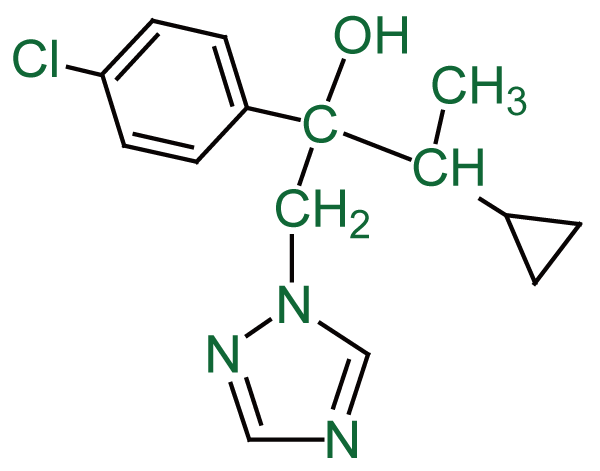- Azoxystrobin
- Bitertanol
- Captan
- Carboxin
- Carbendazim
- Cymoxanil
- Cuprous Oxide
- Copper Hydroxide
- Cyproconazole
- Cyprodinil
- Dimethomorph
- Diniconazole
- Difenoconazole
- Epoxiconazole
- Fluazinam
- Fludioxonil
- Fosetyl-aluminium
- Hexaconazole
- Imazalil
- Iprodione
- Kasugamycin
- Mancozeb
- Metalaxyl
- Metalaxyl-M
- Penconazole
- Propiconazole
- Prochloraz
- Propineb
- Pyraclostrobin
- Thiophanate-methyl
- Tebuconazole
- Tetraconazole
- Tricyclazole
- Triadimenol
- Triadimefon
- Tridemorph
- Trifloxystrobin
Cyproconazole
 other name: a-(4-chlorophenyl)-a-(1-cyclopropylethyl)-1H-1,2,4-triazol-1-ethanol
other name: a-(4-chlorophenyl)-a-(1-cyclopropylethyl)-1H-1,2,4-triazol-1-ethanol
CAS No.: [94361-06-5]
Molecular Formula: C15H18ClN3O
Cyproconazole is an agricultural fungicide of the class of azoles, used on cereal crops, coffee, sugar beet, fruit trees and grapes,[2] on sod farms and golf courses and on wood as a preservative.
Cyproconazole inhibits demethylation, a particular step in the synthesis of a component of the fungal cell wall called sterol. This means it affects fungal growth, but not the fungal sporulation. This explains why it must be used when fungal growth is maximum, early in the infection, because in late infections fungal growth slows down and the agent is ineffective.
APPLICATIONS
Biochemistry Steroid demethylation inhibitor. Mode of action Systemic fungicide with protective, curative, and eradicant action. Absorbed rapidly by the plant, with translocation acropetally. Uses Foliar, systemic fungicide for control of Septoria, rust, powdery mildew, Rhynchosporium, Cercospora, and Ramularia in cereals and sugar beet, at 60-100 g/ha; and rust, Mycena, Sclerotinia and Rhizoctonia in coffee and turf. Formulation types SC; SL; WG
